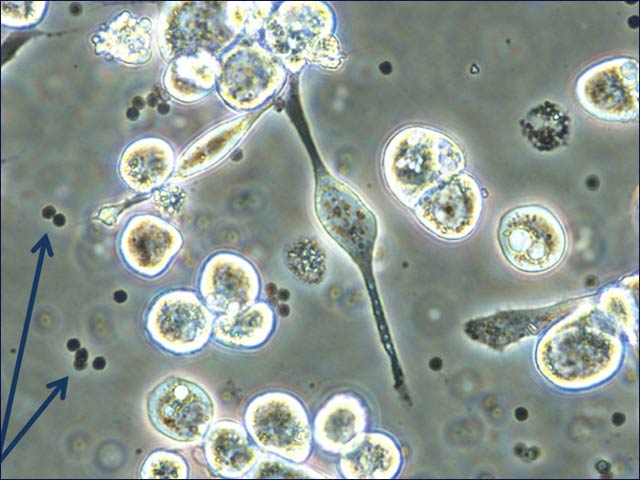By Rivka Borochov
As the Ebola virus rears its ugly head again in Uganda, it’s just a matter of time until this or another deadly virus strikes humanity in epic proportions. An Israeli company hopes to have a new kind of arsenal prepared so that the next big viral war will be an offensive, and not a defensive action. The solution is a nanotechnology scaffold loaded with a chemist’s bag of tools to work as a smart microscopic trap for viruses.
“Viruses are one of the biggest threats to humankind,” says Erez Livneh, the CEO and founder of
Vecoy Nanomedicines, the Israeli company that has developed this new weapon to fight viruses. “A viral pandemic could be more damaging to people than global warming. With overpopulation and international flights –– it’s just a matter of time. We’d like to be in a situation where we can do something about it.”
Unlike anti-viral injections or drugs that are licensed and on the market, Vecoy is taking a whole
new approach to defeating viruses.
Livneh and his five-person team of biologists and chemists engineered a new nano-scale trapping complex of molecules that dares to outwit viruses – by mimicking human cells, luring them to invade a false target and disarming them in the process.
“Every virus has this weak point and it is one element that an ever-changing virus cannot change,” says Livneh, likening this to an Achilles heel. “We target the recognition site to the host site, which attaches to a human cell like a lock and key. If I can change this site the virus will be locked, and will commit suicide. Complete annihilation.”
The nano-trap that no virus can outwit
This is not only a novel medical approach, it also addresses one of the largest challenges when it comes to viruses, because they cannot adapt and develop resistance to Vecoy as they do to anti-viral drugs.
“Every virus, even an ever-changing adaptive one, has a weak point and it is the one element that cannot be changed,” explains Livneh. “A virus specifically attaches to a cell like a key to a lock. We present the virus with similar decoy targets, leaving it with two choices: either to be susceptible to the Vecoy traps or to mutate so it will be indifferent to the traps -- but then it remains locked outside of the patient's cells, which it can no longer penetrate. This is bad news for the virus on both accounts."

Virus-infected cells after treatment with Vecoy
This new type of anti-viral strategy, based on a completely new way of thinking, could work to target the world’s deadliest viruses, such as HIV, hepatitis B and C and Ebola, as well as others such as the human papillomavirus (HPV) and herpes.
The technology is being tested in Vecoy Nanomedicines' laboratories located at Bar-Ilan University’s nanotechnology center. There the company has deactivated 97 percent of the tested viruses both in Petri dishes and in animal models, using cockroaches.
The company is seeking an additional investment of a few million dollars above its angel investment, in order to test this potentially potent anti-virus in mammals –– the next stage before advancing to clinical trials in humans. Getting to clinical trials could take four or five years, Livneh predicts.
Inspired at NASA camp
Although Livneh had a successful career in both academia and later in biotechnology pharmaceutical companies, this idea to create a new way to target viruses came through a lot of research, reading and curiosity.
He had the drive to create a long-lasting solution for humanity. This is what he brought to the table at Singularity University, a three-month boot-camp for paradigm-shifters in science and research at NASA’s AMES research base in California. There a group of scientists from all over the globe shared ideas, and responded to potential world-changing solutions. Livneh was among 80 scientists invited to stay in the earth-bound residence in 2010. And it was there that the Vecoy idea was hammered out.
With billions of dollars of research money poured into curing viruses, and Nobel prizes handed out to scientists who’ve made foundational research in this field, how does this young scientist from Israel dare to claim that he can solve the problem of viruses?
“It’s all in the novelty of what we are doing. While all the current therapies inhibit the viruses within the infected cell, which is a bit too late, we are targeting viruses outside the human cells and are inactivating them before the damage is done,” says Livneh.
Two hundred years ago when vaccines were first invented, there was a rapid change in managing polio and smallpox, two viruses that in the modern world are virtually wiped out. Livneh aspires to be the pioneer who’ll create tomorrow’s solution in the face of possible biological warfare, bio-terrorism and the next SARS or avian flu epidemic.
The technology could be programmed to inoculate people against a wide range of viruses or be custom-made to target a special one, and could be applied at the first indication of infection or as a prophylactic measure.
“When a doctor says today that you have a viral infection, what he is saying is that he doesn’t know what you are suffering from. The common treatment is to go home, rest and have some chicken soup. That might be reasonable when we are talking about one day of fever, but it’s not at all the case when we’re looking at some of the world’s most deadly pathogens like AIDS, Ebola, and bio-warfare agents,” says Livneh.
“Viruses are our smallest, largest enemies and we have set our minds to making a difference to tip the odds to humanity's side."